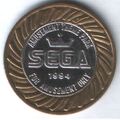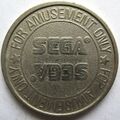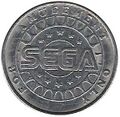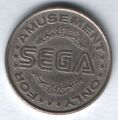Difference between revisions of "Medal game"
From Sega Retro
m |
m |
||
| Line 1: | Line 1: | ||
In Japan, a '''{{PAGENAME}}''' (メダルゲーム) is a type of arcade game which uses "medals" (tokens, usually metal coins) as a form of currency. [[Sega]] is one of many companies which produces these types of games. | In Japan, a '''{{PAGENAME}}''' (メダルゲーム) is a type of arcade game which uses "medals" (tokens, usually metal coins) as a form of currency. [[Sega]] is one of many companies which produces these types of games. | ||
| − | |||
| − | |||
==Background== | ==Background== | ||
| Line 36: | Line 34: | ||
}} | }} | ||
|cols=4}} | |cols=4}} | ||
| + | |||
| + | ==See also== | ||
| + | *[[Prize game]] | ||
| + | *[[Redemption game]] | ||
==References== | ==References== | ||
| − | <references /> | + | <references/> |
| + | |||
[[Category:General interest]] | [[Category:General interest]] | ||
Latest revision as of 05:15, 12 January 2024
In Japan, a Medal game (メダルゲーム) is a type of arcade game which uses "medals" (tokens, usually metal coins) as a form of currency. Sega is one of many companies which produces these types of games.
Contents
Background

Laws in Japan laws forbid any machine from gambling with real currency (i.e. accepting money without the guarantee of a return), regardless of value. The restrictions meant that in the 1950s and 1960s, slot machines (which constituted a big part of Sega's business) could not be sold (legally) in Japan, and while elements of skill were sometimes added to circumvent the laws (for example, 1964's Olympia Star), it was not a business that companies could thrive in.
Around 1974, Sigma introduced a system of "medals" to arcades (or "game centers" as they are typically known in Japan). By minting its own currency, customers could exchange yen for coins which had no cash value, use them in Sigma-operated "medal games" and gamble with what was effectively fake money. Medals could not be converted back to yen, and their distinct size and shape meant they could only be used in game centers.
Sigma's medals shared similar dimensions to the US 5¢ (nickel) piece, and with other companies following Sigma's ideas, an unofficial "standard" was created for medal sizes. However, some companies (including Sega) opted for the slightly larger "25¢" medals, with similar dimensions the the US 25¢ (quarter) piece.
25¢ medals in particular were open to abuse, as their size was initially similar to the ¥10 coin. As it often worked out cheaper to use the real currency over the fake one, the dimensions were tweaked, meaning despite its name, 25¢ medals are no longer the same size as the US quarter. Modern machines perform more checks, ensuring for example that the coins are ferromagnetic. They are also more likely to reject medals from other venues.
Medal games exist in other parts of the world (though most countries opt to use the term "tokens"), though as North America and Europe are less averse to gambling in small amounts, machines are more likely to take real coins. It is also not uncommon to see standard video game arcade machines be equipped to accept tokens rather than real cash.
Sega medal games
Sega has been producing medal games since the early 1970s, although production ramped up in 1986 - the year when the industry first boomed in Japan. As these products were produced almost exclusively for a domestic audience, the precise history is not known in the Western world, however by the 1990s Sega was maintaining hundreds of arcade venues and by extension, "medal corners" across Japan.
Sega does not allow customers to directly exchange medals for prizes, however prizes can be won during some medal games.
Gallery
List of medal games
- 3-Way Bingo (1973)
- Double-Up (1974)
- Faro (1974)
- Five Star 96 (1974)
- Silver Falls (1974)
- Harness Race (1974)
- Group Bingo (1975)
- Match 'em Up (1975)
- Punto Banko (1975)
- Spinna Coin (1975)
- Black Jack (1976)
- Paybak Gun (1976)
- Black Jack Singler (1977)
- Faro II (1977)
- Skill Ball (197x)
- New Faro (1980)
- Grand Derby (1981)
- New Grand Derby (1981)
- Video Poker (1981)
- Video Black Jack (1982)
- Faro III (1983)
- Miracle Hat (1983)
- Penny Ocean (1983)
- Pachinko Derby (1983)
- Roulette King (1983)
- Super Derby (1984)
- Faro King (1985)
- Lucky Carnival (1985)
- Super Derby II (1985)
- Lucky Card (1985)
- Ocharaka Hoi (1986)
- World Bingo (1986)
- World Derby (1988)
- Faro Jack (1988)
- Flush Poker (1989)
- Liberal (1989)
- Bingo Circus (1989)
- Golden Wave (1989)
- 5 Line Pay (198x)
- Exciting Black Jack (1990)
- Vegas Street (1990)
- Blicks (1991)
- Derby Day (1991)
- Joker's Wild (1991)
- Star Burst (1991)
- Tinker Bell (1991)
- Royal Club (1991)
- Royal Ascot (1991)
- Golden Night 21 (1992)
- Western Dream (1992)
- Chiki Chiki Machine Mou Race (1993)
- Royal Ascot Special (1993)
- Winning Draw (1993)
- Winning Joker (1993)
- Bingo Party (1993)
- Exciting Boat Race (1993)
- Golden Keno (1994)
- Bingo Party Multicard (1994)
- Bingo Party Special (1994)
- Super Dice Craps (1994)
- Castle Coaster (1995)
- Bingo Fantasy (1996)
- Royal Ascot II (1996)
- Roulette Club (1996)
- Bingo Party Phoenix (1996)
- Circle Fantasy (1996)
- Royal Ascot II Standard (1997)
- Yatterman (1997)
- Bingo Planet (1997)
- Bingo Planet Plus (1998)
- Nerae! Super Goal (1998)
- Technical Bowling (1998)
- Yatterman Plus (1998)
- Black Jack H.A. (1998)
- Challenge Golf (1999)
- Baseball Stadium (1999)
- Galaxy Dream (1999)
- Choro Q Hyper Racing 5 (199x)
- Exciting Boat Race Special (199x)
- Jackpot Slider (199x)
- Penny Fall Special (199x)
- Progressive (199x)
- Ronjan (199x)
- Royal Derby (199x)
- Deuce's Wild (19xx)
- Draw Poker (19xx)
- Sky Challenger (2000)
- Soreike! Shiyouboutai (2000)
- Hashire! Patocar (2001)
- Ginga Tetsudou 999 (2001)
- Slot Battler (2002)
- Ganbare! Hamster (2002)
- Iruka no Basket (2003)
- Tairyou Dai-chan (2003)
- Gacha Mambo! (2004)
- Bingo Party Splash SP (2004)
- Fantasy Arena (2004)
- Mirage World (2004)
- Disco Dream (2005)
- StarHorse 2 New Generation (2005)
- Gacha Mambo! Saboten Carnival (2006)
- StarHorse 2 Second Fusion (2006)
- Medalink (2007)
- StarHorse 2 Third Evolution (2007)
- Uno the Medal (2008)
- Kids Yataimura Kingyosukui (2008)
- StarHorse 2 Fourth Ambition (2008)
- Kids Yataimura Shateki (2009)
- StarHorse 2 Fifth Expansion (2009)
- Galileo Factory 2 (2009)
- Kids Yataimura Takoyaki (2010)
- Arabian Jewel (2010)
- Ami No. 3 (2010)
- StarHorse 2 Final Destination (2010)
- Lady Luck (2011)
- Medal de Fantasy Zone (2012)
- Bingo Drop (2012)
- Galileo Factory 3: Planet Zero (2012)
- Medal Senshi Butsuke Ranger (2012)
- Hako Emaki Manpuku Doubutsuen (2013)
- Hokuto no Ken Battle Medal (2013)
- Kids Wan Paku Mura (2014)
- Gacha Mambo! Jr. (2015)
- Babel no Medal Tower (2016)
- Letsri Go! (2018)
- Babel no Medal Tower W (2019)
- StarHorse4 (2019)
- Hako Emaki Shinguru Manpuku Suizo Kukan (201x)
- Gutsri Go! (2021)
- Pokémon Corogarena (2022)
- Monopoly The Medal American Dream (2023)
- Hori A Tale (2023)
- Bingo Theater (2023)
- Jackpot Circus (2024)



